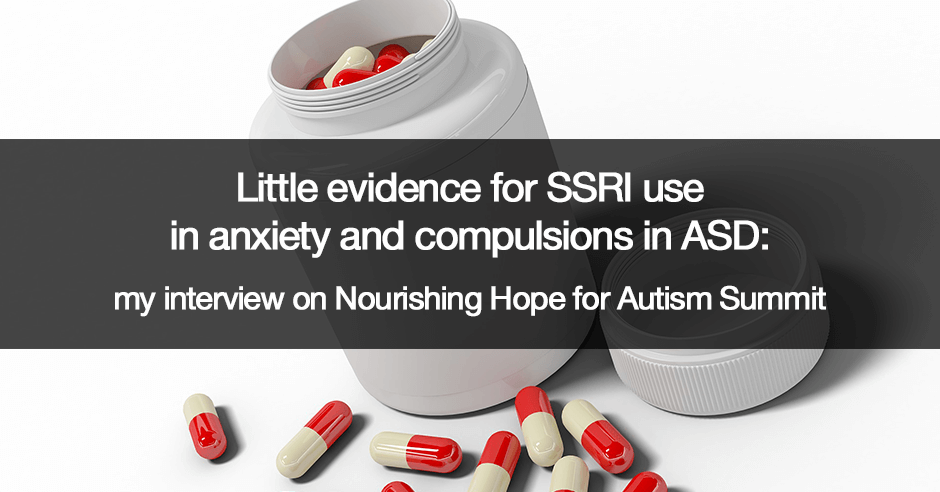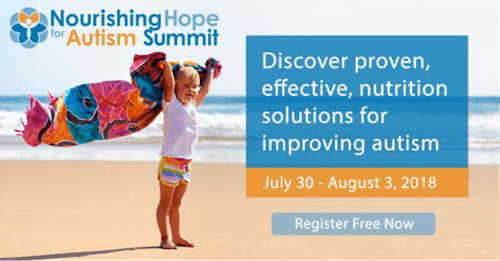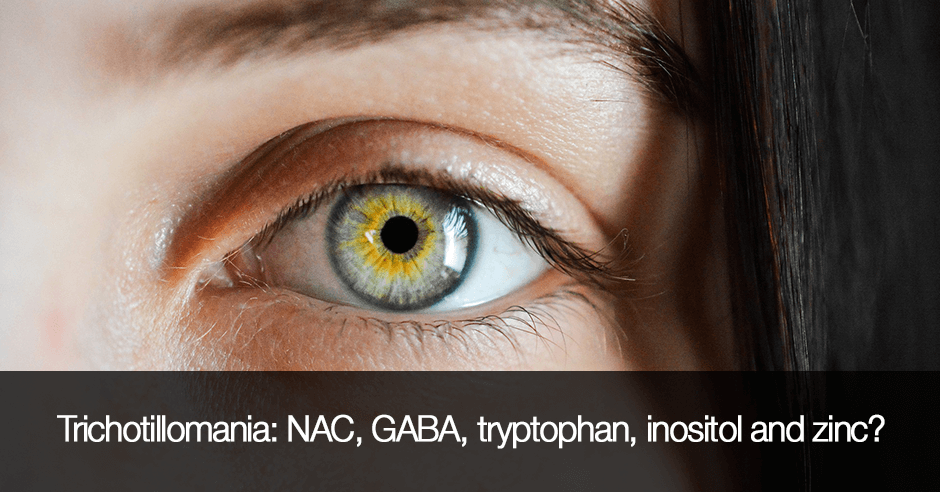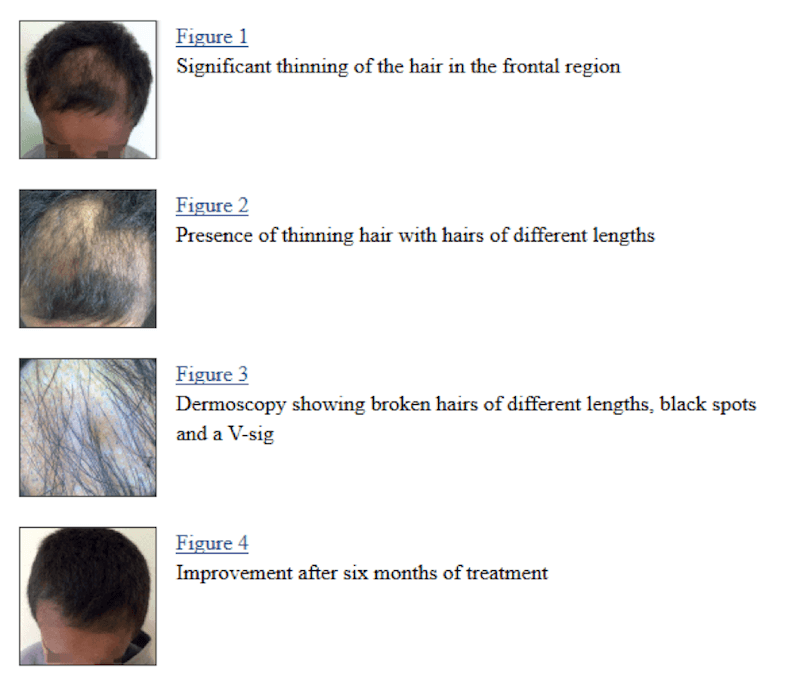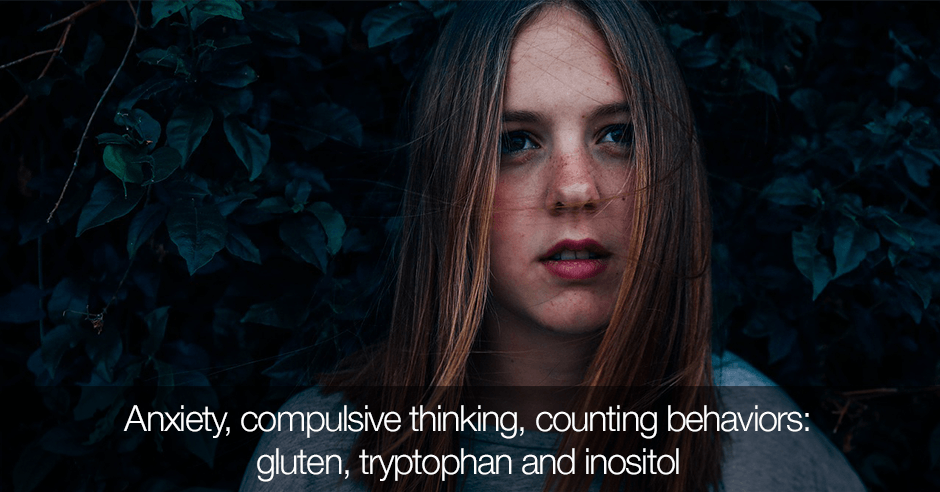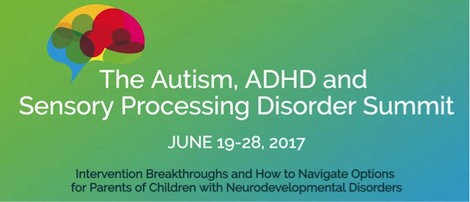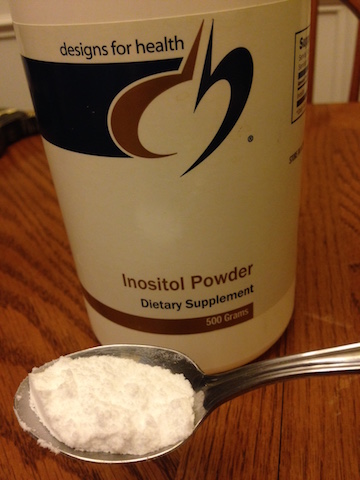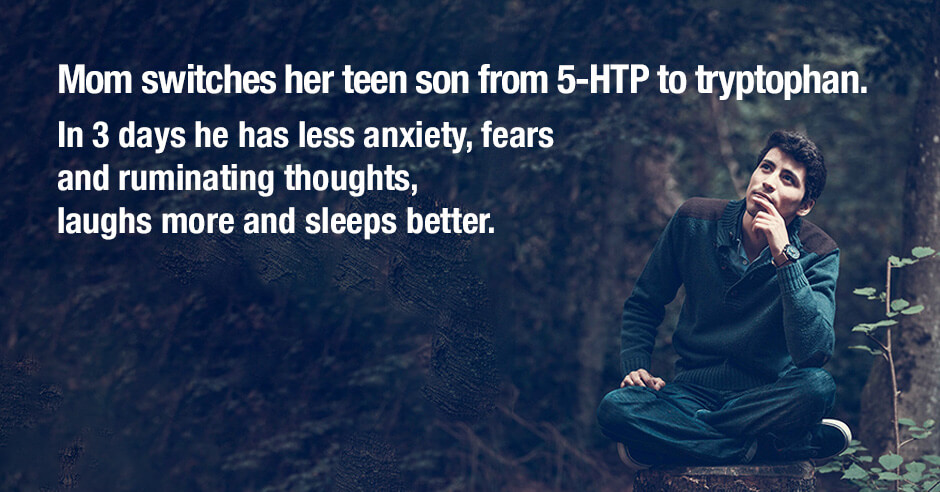
My son has autism and OCD. I took him off fluvoxamine in May and used cbd and some other things and he was doing fine up until this past winter. He began having irrational fears and ruminating thoughts/fears that would not stop! I started 5-HTP, theanine, B12, probiotics with him for the last month and did not see any improvement. I was ready to go back to the medication when I came across your blog and information.
I assumed 5-HTP would be better for OCD, but after reading your comments you mentioned that you just switch to tryptophan if the 5-HTP is not working. I had tryptophan at home already. That night I emptied half a capsule into a little stevia flavored water and had him hold it in his mouth for a minute.
He was a different kid after that!!!! This is just the 3rd day but even his teachers are telling me he is doing really well and is less anxious at school. I am so thankful! I am now giving him 500mg in the morning and early evening.
I bought some inositol and plan to try adding that in the afternoons to see if that will help as well. I believe that he has PANDAS. He is a hand washer, and spits a lot, and has lots of other quirks that I would love to see decrease.
I have hope again! I am buying your book so that I can get a good plan going for him. If you have any other suggestions for him please let me know!!
This wonderful feedback was posted in the comments of one of the tryptophan blogs. I’m so thrilled for this mom and young man (he’s almost 20). I thanked her for sharing all this on the blog and offered to share additional generic feedback via a new blog post. I also asked for additional feedback on exactly how the tryptophan helped (more on that below).
Read on to learn how tryptophan helped with his ruminating thoughts, fears, crying and improved his sleep. And my insights about the ideal timing of tryptophan, finding the optimal dose and why it may work when 5-HTP doesn’t. I also share some insights about inositol and OCD (obsessive compulsive disorder).
Low serotonin symptoms and the questions I had about his symptoms
I do hope he continues to see these benefits. Seeing such amazing results in 3 days is always what we’re looking for and it’s not unexpected to get such profound results so quickly!
I had some additional questions so I could share some general feedback as to how I work in situations like this. I wanted to know his age and if the switch to tryptophan helped any of his OCD symptoms and if yes how many notches improvement?
And which of the classic low serotonin symptoms the tryptophan helped and by how much: anxiety? irrational fears? and ruminating thoughts/fears? anything else? (all the low serotonin symptoms here)
Knowing this helps me know if I’m on track with a client i.e. the tryptophan is helping with low serotonin symptoms. And it also helps me decide we should consider increasing the dose and possibly adjust the number of times to use tryptophan. I share more about this below.
Tryptophan helps reduce his ruminating thoughts, fear and anxiety. And he’s laughing more and sleeps better
She shared some specific examples as to how much the tryptophan helps reduce his ruminating thoughts, fear and anxiety. And he’s laughing more and it helps him sleep:
He would often call me or text me throughout the day with questions about his health, and he would come to me 10-15 times in the afternoons/evenings, for about 3 weeks or so, and ask me the same questions about a rare disease that he believed he had.
He would cry and shake with fear and anxiety at some point and I would need to reassure him over and over again that he did not have this disease, and that it was literally impossible for him to have it.
After starting the tryptophan supplements 2x500mg morning/early evening he did not come to me at all and seemed content the 1st day.
Yesterday, he didn’t get the 2nd tryptophan until 5pm so he did come to me with 1 question/concern. I reassured him and he seemed fine especially after his supplement. Then 1 more question later that night but he accepted my reassurance both times and let it go.
So that was a big difference compared to the last 4 weeks. He was also laughing at some cartoon he was watching which I had not seen him do for a month either. Anxiety is less. He is sleeping better too. So far he still seems to believe the irrational things.
Tryptophan is clearly helping so many of his symptoms but we have more opportunities for further gains with tryptophan.
Tryptophan for low serotonin: dosing and timing
As I share in my book and other blog posts, typically 500 mg tryptophan twice a day is a good starting dose, used away from protein mid-afternoon and evening. It’s used like this because serotonin starts to decline in the afternoon. We increase based on individual needs to find the ideal dose. We may also add tryptophan or 5-HTP earlier in the day.
In a situation like this, if we were working together, I’d consider the following:
- Adding a mid-afternoon dose of tryptophan
- A switch to just afternoon and evening dosing (unless the morning dose was used for a specific reason i.e. morning symptoms)
- Adding a second dose of tryptophan each time (he is using Nature Stacks Serotonin Brain Food and I’d recommend Lidtke 500 mg tryptophan for the second dose each time because it contains only tryptophan)
With changes we do one thing at a time and track symptom improvements carefully.
Tryptophan vs 5-HTP?
I commend her for figuring out the switch from 5-HTP to tryptophan.
It’s a well known fact that some folks just do better on one vs the other and if 5-HTP isn’t working I’ll have clients switch to tryptophan and vice versa. I typically start with tryptophan because it seems to be better tolerated. The biggest issue that I see with 5-HTP is that it’s often not tolerated if you have high cortisol. It can also cause nightmares for some folks.
Precaution about serotonin syndrome with tryptophan/5-HTP
There are precautions when using certain amino acids and I always review them with all my clients. If they have been prescribed an SSRI, I have them discuss the use of tryptophan/5-HTP with their prescribing doctor so they can be monitored for serotonin syndrome. With careful monitoring and doctor approval I feel comfortable having my clients use tryptophan/5-HTP 6 hours away from their one and only SSRI.
If they are using more than one SSRI and/or a combination of psychiatric medications, the use of tryptophan/5-HTP is not advised.
None of the above applied in this situation but it’s important to be aware of.
Inositol and OCD: when to consider adding it?
OCD or even mildly obsessive behaviors or thoughts can be a sign of low serotonin. I will do a trial of tryptophan as above and for some folks it’s often enough. Sometimes tryptophan at least helps to some degree and when it’s not enough, adding inositol (a B vitamin) takes it to the next level.
For many folks 500 -1000 mg capsules are typically recommended but this is a really low dose for OCD. The powdered form is really effective because you can increase as needed. You can actually go as high as 18g. I start low, with 1-2g in kids and adults, and keep going up by 2g a week until the obsessive symptoms disappear. More on inositol and OCD here.
GABA, dopamine and endorphin support too
She mentions that her son “seems to be low serotonin, low GABA (1st 1/2 of the list), low endorphins and low catecholamines” so other amino acids are likely to be of benefit too.
As always we used the neurotransmitter symptoms questionnaire and do trials of each amino acid: GABA for low GABA symptoms, DPA for low endorphins and tyrosine for low dopamine. These trials of each one are done one at a time with careful tracking to find the ideal dose before layering in the next amino acid.
Using the amino acids so it’s easy to reduce sugar and go gluten-free
I also asked what dietary changes he has already made and she responded: “We are in the process of reducing sugar and going back to gluten-free as much as possible but this will be hardest to stick to. Have done a keto-like and gluten-free-casein-free diet on and off since he was 4 years old.”
This is a great start and using the amino acids help reduce cravings and make it easy to reduce sugar and go gluten-free.
There is a sugar cravings aspect to all the neurotransmitter imbalances. The type of craving can be found on the above symptoms questionnaire. It’s not uncommon to need support in more than one area:
- Low serotonin – tryptophan or 5-HTP for afternoon/evening cravings
- Low endorphins – DPA for comfort/reward eating
- Low catecholamines – tyrosine for low energy sugar cravings
- Low GABA – GABA for stress eating
You can read more about this here: The individual amino acids glutamine, GABA, tryptophan (or 5-HTP), DPA and tyrosine are powerful for eliminating sugar cravings, often within 5 minutes
I’m glad she is getting a copy of my book The Antianxiety Food Solution. It has all the foundational dietary information, sections on cravings and a chapter on the amino acids.
It also has a chapter on pyroluria, which is very common in autism and something I help most of my clients address. Here is the pyroluria questionnaire.
Tryptophan and inositol product options
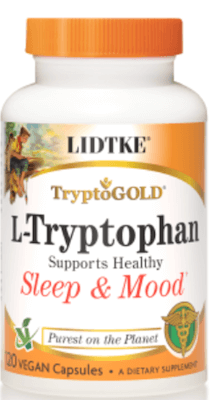
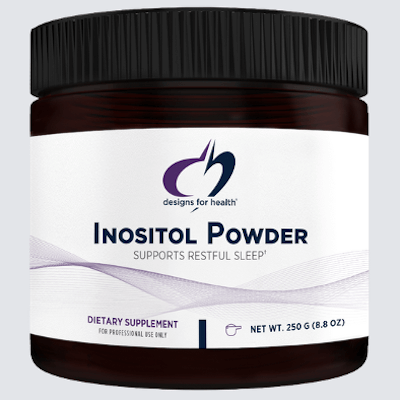
Products I recommend include Lidtke 500 mg Tryptophan and Designs for Health Inositol Powder. You can purchase these from my online store (Fullscript – only available to US customers – use this link to set up an account).
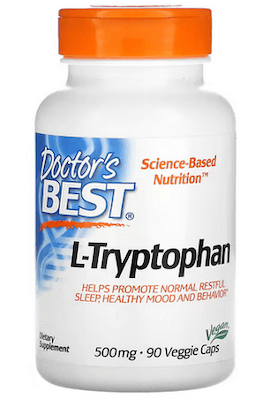
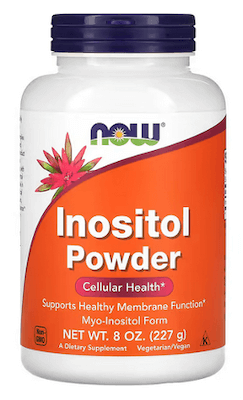
If you’re not in the US, Doctor’s Best L-Tryptophan 500mg and Now Inositol Powder are products I recommend on iherb (use this link to save 5%).
Additional resources when you are new to using tryptophan and other amino acids as supplements
We use the symptoms questionnaire to figure out if low serotonin or other neurotransmitter imbalances may be an issue for you.
If you suspect low levels of any of the neurotransmitters and do not yet have my book, The Antianxiety Food Solution – How the Foods You Eat Can Help You Calm Your Anxious Mind, Improve Your Mood, and End Cravings, I highly recommend getting it and reading it before jumping in and using amino acids on your own so you are knowledgeable. And be sure to share it with the practitioner/health team you or your loved one is working with.
There is an entire chapter on the amino acids and they are discussed throughout the book in the sections on gut health, gluten, blood sugar control (this is covered in an entire chapter too), sugar cravings, anxiety and mood issues. The importance of quality animal protein and healthy fats is also covered.
The book doesn’t include product names (per the publisher’s request) so this blog, The Antianxiety Food Solution Amino Acid and Pyroluria Supplements, lists the amino acids that I use with my individual clients and those in my group programs.
If, after reading this blog and my book, you don’t feel comfortable figuring things out on your own (i.e. doing the symptoms questionnaire and respective amino acids trials), a good place to get help is the GABA QuickStart Program (if you have low GABA symptoms too). This is a paid online/virtual group program where you get my guidance and community support.
If you are a practitioner, join us in The Balancing Neurotransmitters: the Fundamentals program. This is also a paid online/virtual program with an opportunity to interact with me and other practitioners who are also using the amino acids.
Have you had success with tryptophan for anxiety, fears, crying and ruminations? And has it also helped with sleep, how happy you feel and reduced cravings? Has it also helped with OCD?
Did you first trial 5-HTP and then found tryptophan worked better or vice versa?
If yes, what dose and when do you use it?
What about using inositol to further reduce OCD? And what dose helped?
If you’re a practitioner do you use tryptophan and/or inositol with clients/patients with these low serotonin symptoms?
And please let me know if it’s helpful that I’m now including product recommendations and where to get them?
Feel free to share and ask your questions below.
